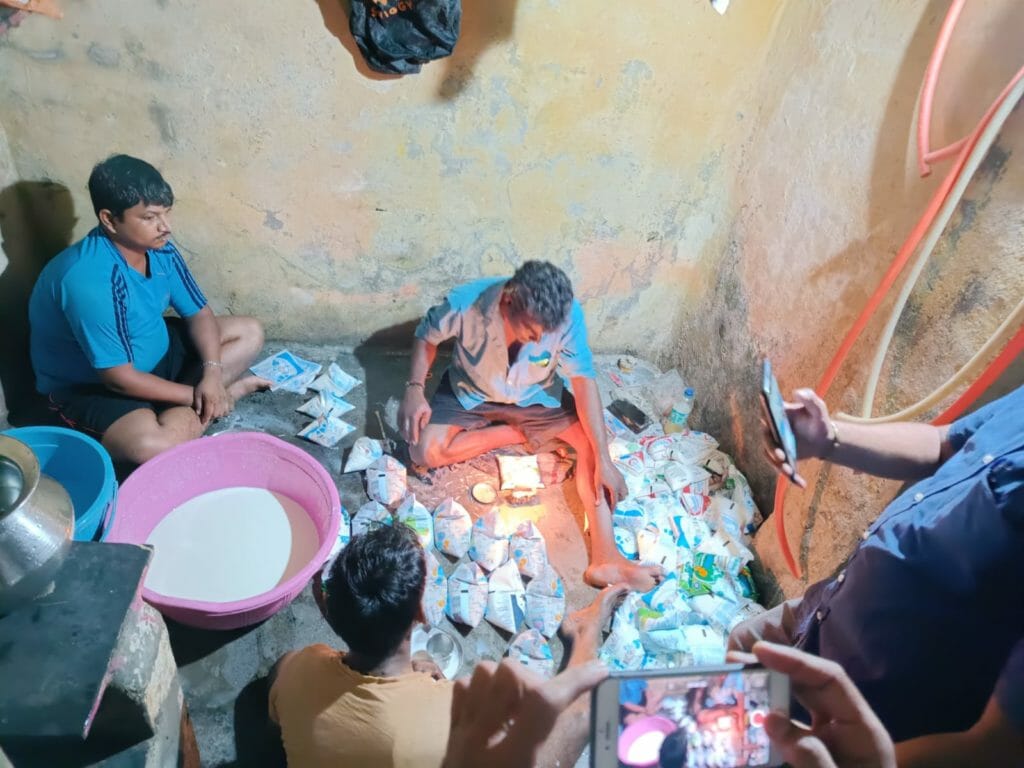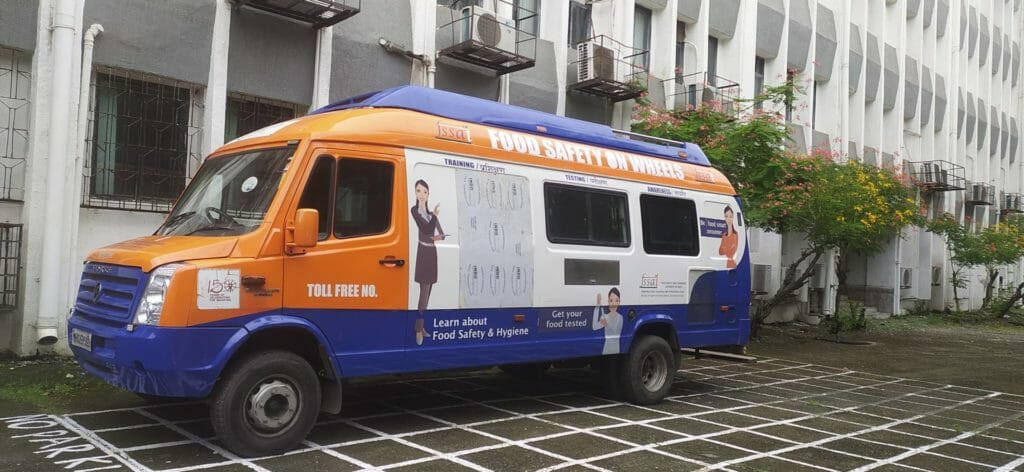The Food and Drugs Administration (FDA) unearthed a major milk adulteration racket operating from Dharavi recently, on September 15th. The accused were found slitting the milk packets and removing the milk. They replaced it with water before sealing the cut part with candle flame.
The FDA officials seized and destroyed about 807 litres of adulterated milk worth Rs 45, 852. The FDA launched criminal proceedings in a joint operation with the Shahu Nagar police station.

In another instance, a Marathi daily reported about how a customer received a smelly spurious packet of edible oil from an online shopping app. The oil packet was slit and sealed unevenly from one corner and also weighed less. The app helpline initially refused to either return her money or accept onus for their fault. Later, they did promise action and return money following her tweet.
Instances of adulteration of food or distribution of expired food, spoilt food are not very uncommon. But, often people are ignorant about where and how to raise the issue and follow it to its logical conclusion.
Read more: How safe is the milk you drink?
So what should one do if you come across adulterated food?
In case you suspect that the food product you have purchased is either adulterated or contaminated, poisoned, sub-standard quality or suspect it to be laced with prohibited additives, you can complain to the FDA. This complaint could be lodged by way of a phone call.
Their helpline 1800 – 112100 or SMS / WhatsApp on 98686 86868.
One could also mail it to the joint commissioner of FDA of greater Mumbai Shashikant Kekre on jtfdagb@gmail.com or raise a ticket on their website.
Complainants also have the option to lodge a complaint anonymously. “It’s important to give your name though, as we could share feedback about the initial status of the case with them,” explains Kekre.
What happens when one lodges a complaint?
The FDA first sends its officials, the food safety officers, to be specific, to verify the complaint. The officer makes an official purchase of the food items there and then takes the samples to be sent to the food laboratory.
What should one do to ensure action on complaints made?
It’s always important to retain the receipt of the purchase of food products or even food consumed in a restaurant. No receipt, no proof of purchase and thus no case, says the FDA. In fact, to file a complaint online, it is mandatory to upload a copy of the receipt.
Ideally, one should lodge a complaint quickly and submit the samples to the laboratory at the earliest. This helps the investigation team track the raw material and the stocks. A laboratory report is generally available in a fortnight’s time. However, the legal paperwork that follows should take about three months or beyond. It depends on the complexity of the issues involved.
Why do officers make an official purchase?
The receipt of purchase is an important piece of evidence to show that the food item was being sold in shops and not part of loose stocks. The receipt also documents the date of the crime and could help in tracking the raw materials or ingredients of the food items. Once the laboratory report confirms that the sample is of poor quality, then proceedings are launched against the offenders.
Other ways to check adulteration of food items
In case one suspects a food item on sale is adulterated, one has the option to get it checked directly from a laboratory – either the one run by the FDA or by the Brihanmumbai Municipal Corporation (BMC) at Dadar. One also has the option to get it checked from the various private food laboratories. These must be approved by the National Accreditation Board for Testing and Calibration Laboratories (NABL). A list of private labs and addresses is available on their website.
Once the laboratory report confirms the adulteration, then a formal complaint is lodged under sections of the Food Safety and Standards Act, 2006 (FSSA). Thereafter the adjudicator hears and decides the matter, which is the office of the joint commissioner of FDA, who is the designated State Commissioner of Food Safety in Mumbai. In cases pertaining to unsafe food that can cause harm to health, judicial proceedings are moved at the special FDA court at Sewri.
What is the FDA’s regular course of action?
The FDA’s food safety officers (earlier known as food inspectors) regularly inspect and check samples from the kitchens serving restaurants and food business operators (FBO). It also checks the quality of dairy and dairy products like paneer, mawa, ghee. It also conducts regular drives against, say milk adulteration. Their team visits and inspects milk coming in from Mumbai’s five entry points. The officials carry the centrifugal machines and various paraphernalia in the Food Safety on Wheels ( FSW) van to determine the quality of milk right on the spot. They immediately seize stocks if they find it to be of substandard quality.

Festival time brings in for more adulteration
Since the festival season spurs huge demand for sweets, edible oils and dairy products, the adulteration rackets also get active during this time. To counter them, the officials conduct special drives between August to December to fight food adulteration. During this campaign, food safety officers mainly visit godowns and shops and godowns of sweets and dairy product sellers. This year the FDA seized 11697 kgs of food products valued at Rs 1,905,120 from 18 raids conducted between May to August. Officials dispose of these foods as per norms.
Read more : Adulterated foods in the markets galore
What is the penalty for selling adulterated food?
Apart from confiscation and destruction of the adulterated foods, the penal action involves a penalty ranging from Rs 25,000 to Rs 10 lakh. Providing substandard food products could lead to penalty up to Rs 5 lakh for a manufacturer/ distributor under Section 51 of the FSS Act, 2006. Providing misleading description or false claims on brand label could invite penalty up to Rs 10 lakh under the Food Safety and Standards (Labelling and Display) Regulations, 2020.
Further, officers could also serve notices for improvement ( giving time to improve), recall foods (order foods to be withdrawn from the market) or even cancel food licences of establishments.
How does the FDA track food adulteration?
Adulteration is usually spotted through checks on the authenticity of the products. Tip-offs also help them unearth rackets operating in the market. The police conducts joint raids with the local police stations with the help of such tip-offs. The police investigation focuses on nabbing the offenders but the FDA tends to focus on the quality of the food products in question. They then provide their food analysis report to support the police case.
Another interesting way is to track the raw material stocks. With Mumbai no longer a food manufacturing hub, adulteration here takes place mostly during the repackaging process. This is especially true of adulteration of edible oils, which has seen a surge due to spike in oil prices. “Generally, the cheaper Palm oil is added to oils like that of sunflower or mustard or groundnut. We tally the documents showing procurement of oils in bulk and check if it matches with the weight of the packaged stocks to figure out if it has been adulterated with cheaper palm oil,” explains Kekre.
How does the FDA dispose of adulterated food?
Officials generally drain away adulterated milk diluted with water or laced with urea. They burn off other stuffs like Gutka. Edible oil mixed with palm oil may be adulterated but useful for commercial purposes. Hence it is sold in the open market .
🚨🍴 If you spot adulterated food, don’t stay silent! 📞 Report to FDA, keep your receipt 🧾, and help stop unsafe food from reaching others 🛑🥛🌶️.